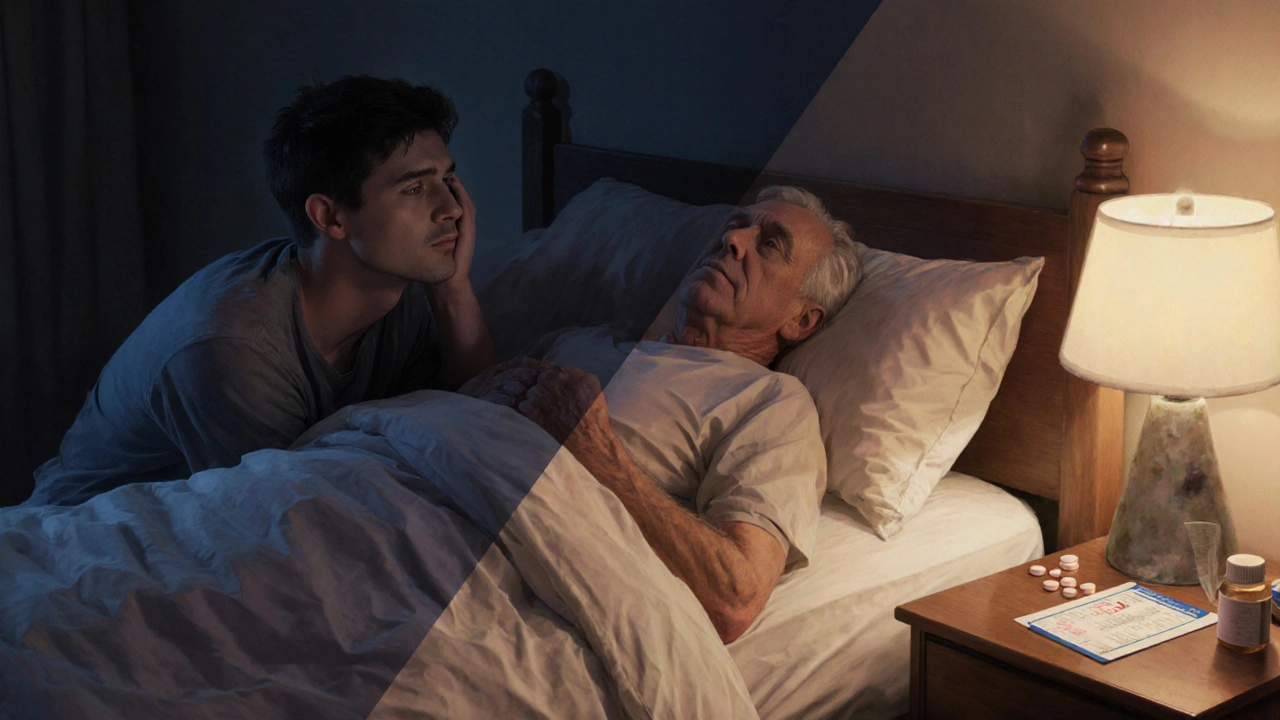Ejaculation Timing Assessment Tool
This tool compares your ejaculation timing against clinical definitions from the article. It is for educational purposes only and does not provide medical diagnosis.
What’s the real difference between premature and delayed ejaculation?
Most men don’t talk about it - not because they’re ashamed, but because they don’t know if what they’re experiencing is normal. Is it too fast? Too slow? Or just bad luck? If you’ve ever wondered whether your timing during sex is a problem, you’re not alone. Premature ejaculation and delayed ejaculation are two sides of the same coin - both are real sexual dysfunctions, but they affect men in completely different ways.
Premature ejaculation: When it’s over before it begins
Premature ejaculation (PE) is the most common male sexual issue after erectile dysfunction. Studies show it affects up to one in three men at some point in their lives. The clinical definition is simple: ejaculation happens within one minute of vaginal penetration, or even before penetration starts. This isn’t just about speed - it’s about lack of control. You want to last longer, but your body won’t let you.
Some men with PE can have multiple rounds in a short time - they get hard again fast and ejaculate quickly each time. That’s the stenic type. Others lose their erection right after climax and can’t go again - that’s the asthenic type. Neither is "better." Both cause frustration, anxiety, and often make men avoid sex altogether.
Why does it happen? It’s rarely just "nerves." Research points to a mix of biological and psychological factors. Low serotonin levels in the brain, oversensitive penile nerves, early sexual experiences that trained the body to rush, and anxiety about performance all play a role. It’s not weakness. It’s a neurochemical response.
Delayed ejaculation: The frustrating slow burn
Delayed ejaculation (DE) is the opposite problem - it takes forever to reach climax, if it happens at all. Defined as taking more than 30 minutes of stimulation, or failing to ejaculate in at least 75% of attempts over six months, it’s far less common than PE. Only 1-4% of men experience it regularly, though some studies in Czech populations suggest it might be higher.
Men with DE often describe feeling aroused and enjoying sex, but the orgasm feels out of reach. They might climax during masturbation but not with a partner. Or they need extreme pressure, unusual positions, or fantasy to get there. Sometimes, they never do.
The causes are more straightforward than PE. Medications are the biggest culprit - especially SSRIs (antidepressants like fluoxetine or sertraline), blood pressure drugs, and anti-anxiety meds. Diabetes, nerve damage from surgery, spinal injuries, and chronic alcohol use also interfere with the ejaculatory reflex. In older men, it’s often just aging - semen volume drops, sensitivity decreases, and the body takes longer to respond.
How doctors tell them apart
Diagnosis isn’t guesswork. For premature ejaculation, doctors use something called IELT - Intravaginal Ejaculation Latency Time. If you ejaculate within 60 seconds of penetration, that’s a clear sign. For delayed ejaculation, it’s about consistency. Has this been going on for half a year or more? Does it happen every time, or just with certain partners? Did it start after a new medication or a medical event?
Men with PE often worry their partner is unsatisfied. Men with DE often feel broken - like their body has betrayed them. Both feel isolated. But the emotional toll is different. PE brings shame and avoidance. DE brings helplessness and confusion.
Treatment: What actually works
There’s no one-size-fits-all fix, but both conditions respond well to the right approach.
For premature ejaculation:
- Behavioral techniques - The "start-stop" method and the "squeeze technique" help retrain your body’s response. Practice during masturbation. Learn to recognize the point of no return and pause before hitting it.
- Topical anesthetics - Sprays or creams with lidocaine reduce sensitivity. Use them 10-15 minutes before sex and wipe off excess to avoid numbing your partner.
- SSRIs (off-label) - Medications like dapoxetine are approved in some countries specifically for PE. Others like paroxetine or sertraline are used off-label. They delay ejaculation by increasing serotonin. Side effects? Nausea, drowsiness, reduced libido - but many men find the trade-off worth it.
For delayed ejaculation:
- Review your meds - Talk to your doctor. If you’re on antidepressants and notice changes in ejaculation, ask if there’s an alternative. Never stop cold turkey.
- Address underlying health issues - If you have diabetes, high blood pressure, or nerve damage, managing those conditions can help. Good blood sugar control improves nerve function.
- Sex therapy - A therapist can help you reconnect with physical sensation. Sensate focus exercises, removing performance pressure, and exploring non-goal-oriented touch can reset your response.
- Erotic stimulation tools - Vibrators or specialized devices that provide consistent, intense stimulation can help men who’ve lost sensitivity.
Age, stigma, and why you’re not alone
PE is more common in younger men - often under 30. DE shows up more in men over 40, especially those on meds or with chronic conditions. But both can happen at any age.
The biggest barrier to treatment? Shame. Men don’t go to the doctor because they think it’s "just a phase" or "all in their head." But these aren’t moral failures. They’re medical conditions with biological roots. The fact that you’re reading this means you’re already ahead of most men who never ask for help.
And here’s something most people don’t tell you: your partner likely already knows something’s off. Silence doesn’t protect them - it isolates both of you. Open conversations, even awkward ones, build trust. Many couples find that working on this together - whether with therapy, exercises, or just honest talks - strengthens their connection more than any quick fix ever could.

When to see a doctor
You don’t need to suffer silently. See a urologist or sexual health specialist if:
- You’ve had PE or DE for more than six months
- It’s affecting your self-esteem or relationship
- You’ve started new medications and noticed a change
- You’re avoiding sex because of anxiety
There’s no test that requires you to be naked in front of a stranger. Diagnosis usually starts with a simple conversation. A doctor will ask about your history, medications, and sexual patterns. That’s it. No needles. No exams - unless they suspect a physical cause.
Final thought: It’s not about timing - it’s about control
Whether you climax too soon or too late, the core issue is the same: you’ve lost control over your body’s natural response. That’s fixable. Premature ejaculation isn’t a sign of being "too excited." Delayed ejaculation isn’t a sign of being "cold." Both are signals - your body trying to tell you something’s out of balance.
There’s no shame in seeking help. And there’s no magic pill that works overnight. But with the right approach - behavioral, medical, or both - most men see real improvement within weeks. You don’t have to live with this. You just have to speak up.
Can premature ejaculation be cured?
Yes, in most cases. Many men see significant improvement with behavioral techniques, topical treatments, or short-term medication. It’s not always a permanent fix, but with practice and patience, control can be regained. Some men find they only need treatment during stressful periods, while others benefit from long-term management.
Can antidepressants cause delayed ejaculation?
Yes, very commonly. SSRIs like fluoxetine, sertraline, and escitalopram are known to delay or block ejaculation in up to 60% of users. This is a documented side effect, not a rare exception. If this is a problem, talk to your doctor about switching to a different class of antidepressant - like bupropion - which has less impact on sexual function.
Is delayed ejaculation normal with age?
It’s common, but not inevitable. As men age, ejaculation often takes longer, and semen volume decreases. But if it’s taking over 30 minutes or doesn’t happen at all, it’s not just aging - it’s a sign something else is going on. Diabetes, nerve damage, or medication side effects are more likely causes than age alone.
Can I have both premature and delayed ejaculation?
It’s rare, but possible. Some men ejaculate quickly during masturbation but struggle to climax with a partner - or vice versa. This is usually situational, not a true dual diagnosis. It often points to anxiety, distraction, or differences in stimulation type. Therapy can help untangle what’s happening.
Does pornography contribute to ejaculation problems?
It can, especially in younger men. Constant exposure to high-intensity, fast-paced porn can train the brain to expect extreme stimulation. When real sex doesn’t match that, it can lead to difficulty ejaculating - or rushing through it to recreate the same rush. Reducing or modifying porn use, especially with slower, more realistic content, often helps reset expectations.
Next steps: What to do right now
Start by tracking your experience. For a week, note:
- How long sex lasted before climax (if it happened)
- What you were doing (masturbation, partner sex, fantasy)
- What you were thinking or feeling
- Any medications you took that day
This simple journal gives you clarity - and gives your doctor a real picture, not just a guess. Then, talk to someone. A urologist, a sexual health counselor, or even a trusted therapist. You don’t need to fix it alone. Help is available. And you deserve to enjoy sex without shame or stress.






